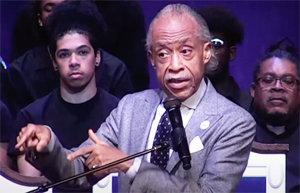
By Alecia Taylor
Howard University News Service
Rev. Al Sharpton delivered a sermon intertwining race, politics and religion Sunday morning at Howard University’s chapel, a day after leading the 60th anniversary of the March on Washington.
Before the activist minister took the stage, many student leaders such as Nia Naylor, president of the Howard University Student Association, Murphy Jones, the vice president, and other student leaders gave remarks about the start of the semester. Hundreds of attendees filled Cramton Auditorium for the Andrew Rankin Memorial Chapel’s service with over 300 people tuned in through the YouTube livestream.
Sharpton is known for his often taboo fusion of religion, current events and politics, and his sermon at the chapel was no different. H addressed the activism in the church, the political climate, racism and bigotry, resonating with many attendees. He spoke about his experiences of people and churches requesting that he not talk about politics.
“If you don’t want to preach the book the way it is, then go do something else,” he said. “Don’t act like we got a misinterpretation of the Scripture. Just get up and say you’re scared, and sit down and shut up and let somebody that’s not scared say what needs to be said.”
His words caused the crowd to clap in agreement. Sharpton insisted that the Bible is political, referring to Exodus as a Civil Rights movement. As he continued, he listed infamous stories from the Bible such as Daniel in the lion’s den. Using the third book Numbers, chapter 13, Sharpton compared the work of Civil Rights leaders to Moses, the prophet who led the Israelites out of slavery.
“People will [say] ‘I don’t believe in marching’ and ‘I don’t believe in all that agitation’ and ‘I go by my own merit,’” he said. “Well that’s good, because some of us marched so your merit would be considered.”
However, the reverend insisted there is still work to be done. He pointed to current political tension that suggests regression such as the overturning of Roe v. Wade, the Supreme Court decision to strike down Affirmative Action and the recent killing of three Black people in Jacksonville, Florida. As people celebrated the 60th anniversary of the March on Washington, a white man walked into a Dollar General killing three people before killing himself.
“Before we could even rest and say, ‘We made a great statement; now we’re gonna see the president and vice president at White House,’ hate jumped back up again to remind us that we’re not there yet,” he told the audience.
Mackenzie Williams, a senior broadcast journalism major from Chicago, attended the sermon and the 60th anniversary for the March on Washington. Like Sharpton, Williams was taken aback by the news of the shooting in Jacksonville.
“Injustice is very much alive and well,” Williams said. “It really should make people be more aware of their choices in this next election.”
Williams said she isn’t really into politics, but his speech at the anniversary march on Saturday and his sermon on Sunday made her want to pay more attention to the politics happening around her.
Annable Jules, a senior television and film major from outside of Philadelphia, was also touched by Sharpton’s message, especially about the gunman.
“It just happens way too often,” Jules said. “We have such glaring progress as a community. All the things that we’re doing and overcoming, even the fact that it was the 60th anniversary of the March on Washington shows how much time has elapsed, but nothing has changed in a grander scheme.”
Jules, who attends chapel often, had never heard Sharpton speak in person. His speech, she said, really touched her and resonated with her journey here at Howard.
One of his talking points used Numbers 3:13, where the author Moses refers to the Israelites as grasshoppers and the sons of Anak as giants, signifying that the Israelites felt inferior. Sharpton used the analogy of some people feeling like grasshoppers compared to other people whom they see as giants.
Sometimes Jules feels like a grasshopper at Howard, but Sharpton’s message reassured her that she, too, is a giant.
“It’s so many ’giants’ that come out of Howard. Even while you are in undergrad, there’s so much talent here. … Everyone’s always doing something,” she said. “It’s very easy to feel like a grasshopper compared to the giants around you. It’s really a time to introspect and really understand that you are a giant among giants.”
As Sharpton closed his speech, he spoke directly to Howard students about their collegiate journey, using the grasshopper-giant analogy. He reassured students that they may find themselves like grasshoppers, but they are giants, like their predecessors who marched 60 years ago.
“Some folk 60 years ago didn’t have a grasshopper complex,” he said. “They kept on fighting and kept on marching and kept on going till 60 years later, we’ve elected and re-elected a Black president.”
Alecia Taylor is a reporter for HUNewsService.com and covered the 60th anniversary of the March on Washington.
